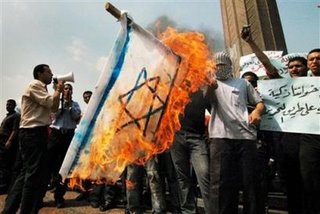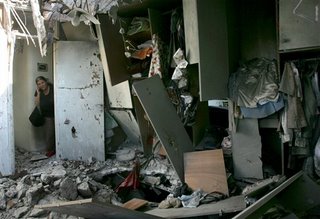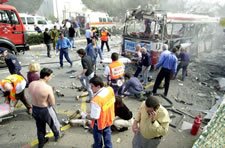Friday, August 04, 2006
Point/Counterpoint: Israel v. Lebanon 2006

Today I posted the first in a series of point/counterpoint posts that would allow the exploration of a particular topic from multiple perspectives. Each topic will begin with a guest post, and then will be followed, some hours later, by a counterpoint article from your friendly neighborhood Nomad.
The hope is that, in the time between the guest post and the counterpoint post, people will have the ability to respond free from influence from my post. This was absolutely the case today, as I received a number of terrific comments to the original post by Davenelli. Hopefully the counterpoint post will evoke many good comments as well.
I hope the end result will be a fruitful dialog on some of the key issues facing the world today. I would also offer to publish any other posts on this topic here, and encourage people with strong opinions to provide them here. Hopefully we’ll see a dialogue that show’s a number of different views on these issues.
Meanwhile, without further ado, here is the counterpoint post to Davenelli’s guest post from earlier today.

Nomad’s Take on Israel V. Lebanon 2006

There is a common perception that the US is either complicit, or maybe even morally negligent, in not reigning in Israel in its war against Hezbollah. The fact is, though, that this view stems from a common misperception that this conflict started as a result of the kidnapping of two Israeli soldiers.
In reality, the kidnapping of the soldiers was little more than an excuse for Israel to protect Israel from a mortal threat, a threat to their existence, namely the consistent attacks on Northern Israel by Hezbollah. And the United States and the international community know that leaving this threat unchecked means the end of any hope for peaceful life in the state of Israel.
Who Is Hezbollah?
 Hezbollah was founded by Syria and Iran during the tail end of the Lebanese civil war, ostensibly to challenge Israel’s occupation of South Lebanon, but in reality providing Syria and Iran a way to attack Israel without jeopardizing their own safety. The Lebanese government was splintered, leaving power in the war-torn country up for grabs. Syria took a number of seats in the Lebanese parliament in the name of Hezbollah, providing a safe launching pad for attacks on arch-enemy Israel.
Hezbollah was founded by Syria and Iran during the tail end of the Lebanese civil war, ostensibly to challenge Israel’s occupation of South Lebanon, but in reality providing Syria and Iran a way to attack Israel without jeopardizing their own safety. The Lebanese government was splintered, leaving power in the war-torn country up for grabs. Syria took a number of seats in the Lebanese parliament in the name of Hezbollah, providing a safe launching pad for attacks on arch-enemy Israel.
Many Lebanese people did not want Hezbollah in their country. The group is certainly not representative of the majority of the Lebanese people. But the Lebanese army was too weak to evict Hezbollah. The Lebanese government formed the South Lebanese Army to battle Hezbollah, but the SLA was far too weak to evict Hezbollah from Lebanon, even with Israel’s help.
Hostility between Israel and Hezbollah
 It should be noted that Israel’s stated intention was not to grab land, but rather to create a buffer zone to prevent Lebanese rockets from hitting the northern Israeli cities. Israel believed that their existence, their entire way of life, was at stake, and that it was essential to the freedom of the Israeli people to have some presence in Lebanon.
It should be noted that Israel’s stated intention was not to grab land, but rather to create a buffer zone to prevent Lebanese rockets from hitting the northern Israeli cities. Israel believed that their existence, their entire way of life, was at stake, and that it was essential to the freedom of the Israeli people to have some presence in Lebanon.
When I first arrived in Israel in 1995, I was on a kibbutz in Northern Israel called Kiryat Shemona for a week while waiting for my ulpan (courses) to begin in central Israel, and it was a hair-raising time. We worked in the fields until the air-raid sirens went off, indicating an inbound Kityusha rocket, which had no explosives but would kill you if it hit you. You watched the rocket reach it’s zenith, saw where it would fall, and if you were close to that you ran. The sirens went off 25-50 times a day.
At the time, few people died from Kityushas. As the years went on, the rockets grew deadlier; they increased in range, accuracy, and they included explosives. Kiryat Shemona was in the northern-most tip of Israel. But earlier this year, the range of these missiles had increased to such an extent as to jeopardize residents all over northern Israel, including cities with denser populations like Haifa, Tiberius, and Nazareth.
In 1996, Israel made a huge push to evict Hezbollah from Lebanon, in an offensive named “Grapes of Wrath”. Israel was making serious headway in the initiative, but failed after a tragic incident: Hezbollah fired rockets from behind a UN aid station, and as Israel retaliated, they hit the aid station, killing many innocent civilians. International pressure stopped the fighting, and Hezbollah learned that they could invoke international sympathy by using Lebanese citizens as human shields.
Israeli Withdrawal from Lebanon
In 2000, Israel decided to unilaterally withdraw from Lebanon, with the hope that Hezbollah would then disband. But Israel’s occupation of Lebanon only provided an excuse for Hezbollah’s actions against Israel, and as such Hezbollah actions against Israel would continue up until the present day.
Hezbollah created more excuses for their actions, claiming that farms in Northern Israel were Lebanese property. But in 2001 even the UN clearly stated that Israel had withdrawn and Hezbollah should disarm. Hezbollah had lost all international legitimacy, and instead reinforced its role as an international terrorist group, perpetrating terrorist attacks on US and Israeli interests around the globe.
Reasons for the Present Conflict
When Hezbollah saw Israel’s reaction to the kidnapping of a soldier in Gaza, they saw an opportunity. By kidnapping Israeli soldiers, they could corner Israel; if Israel failed to react, they would be seen as hypocritical or bullies of the Palestinians, whereas if they did react they would have to reengage in Lebanon, which would invariably mean victimizing the Lebanese citizens.
The thought was that by causing Israel to cause such death and destruction in Lebanon would incite the wrath of the entire Muslim world, and ultimately fulfill Iran’s prophecy of the destruction of Israel. As of yet, the Islamic world has realized that this is Hezbollah’s goal and refrained from entering the conflict. But that still remains the largest threat in this conflict.
The Lebanese Citizens
Hezbollah knew that the citizens of South Lebanon would be in the line of fire, and in fact increased the risk to these citizens by firing missiles from populated areas, including behind schools, hospitals, and the actual homes of South Lebanese residents. Why did the South Lebanese allow this? Some people allowed this because they agree with Hezbollah’s attack of Israel. But many allowed this because they had no ability to resist Hezbollah’s efforts.
One also needs to consider that, in reality, the Lebanese citizens are victims of Iran and Syria. The governments of both countries want to attack Israel, but neither wants to jeopardize their own homeland. So they attack from Lebanon, which cannot prevent the attacks, and allow the recently rebuilt country to be destroyed as Israel goes after the terrorist groups while allowing their benefactors to go unchecked.
Conclusion
Israel had no choice but to address the threat from Hezbollah; the kidnapping of the two Israeli soldiers only pushed the issue. Israel’s existence, its very survival was in question, and still is today if Israel cannot eliminate the threat from Hezbollah. This is the true reason that the United States does not push Israel to stop the offensive – because allowing Hezbollah to exist in its present state, continuing to attack Israel daily, will prevent Israel from ever providing a normal existence to its citizens.
technorati tags: Point, Counterpoint, Israel, Lebanon, Hezbollah, Syria, Iran, South Lebanese Army, Grapes Of Wrath, Kityusha, US, UN, Gaza, Palestine, Middle East
Posted by Scottage at 2:06 AM /
| |






 Hezbollah was founded by Syria and Iran during the tail end of the Lebanese civil war, ostensibly to challenge Israel’s occupation of South Lebanon, but in reality providing Syria and Iran a way to attack Israel without jeopardizing their own safety. The Lebanese government was splintered, leaving power in the war-torn country up for grabs. Syria took a number of seats in the Lebanese parliament in the name of Hezbollah, providing a safe launching pad for attacks on arch-enemy Israel.
Hezbollah was founded by Syria and Iran during the tail end of the Lebanese civil war, ostensibly to challenge Israel’s occupation of South Lebanon, but in reality providing Syria and Iran a way to attack Israel without jeopardizing their own safety. The Lebanese government was splintered, leaving power in the war-torn country up for grabs. Syria took a number of seats in the Lebanese parliament in the name of Hezbollah, providing a safe launching pad for attacks on arch-enemy Israel. It should be noted that Israel’s stated intention was not to grab land, but rather to create a buffer zone to prevent Lebanese rockets from hitting the northern Israeli cities. Israel believed that their existence, their entire way of life, was at stake, and that it was essential to the freedom of the Israeli people to have some presence in Lebanon.
It should be noted that Israel’s stated intention was not to grab land, but rather to create a buffer zone to prevent Lebanese rockets from hitting the northern Israeli cities. Israel believed that their existence, their entire way of life, was at stake, and that it was essential to the freedom of the Israeli people to have some presence in Lebanon. 